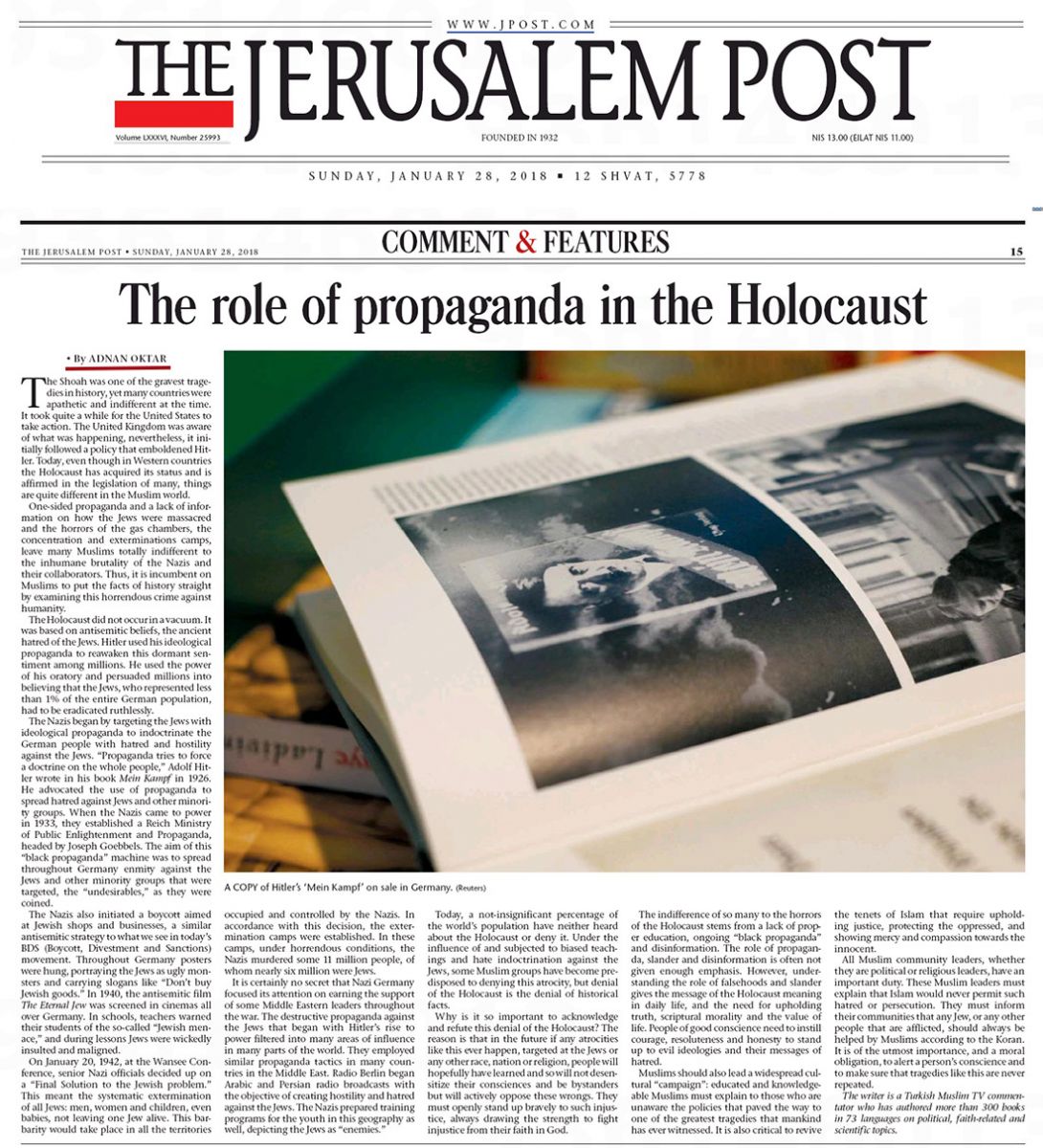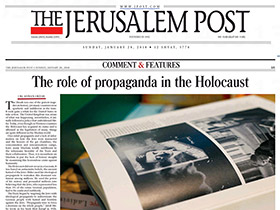
The Shoah was one of the gravest tragedies in history, yet many countries were apathetic and indifferent at the time. It took quite a while for the United States to take action. The United Kingdom was aware of what was happening, nevertheless, it initially followed a policy that emboldened Hitler. Today, even though in Western countries the Holocaust has acquired its status and is affirmed in the legislation of many, things are quite different in the Muslim world.
One-sided propaganda and a lack of information on how the Jews were massacred and the horrors of the gas chambers, the concentration and exterminations camps, leave many Muslims totally indifferent to the inhumane brutality of the Nazis and their collaborators. Thus, it is incumbent on Muslims to put the facts of history straight by examining this horrendous crime against humanity.
The Holocaust did not occur in a vacuum. It was based on antisemitic beliefs, the ancient hatred of the Jews. Hitler used his ideological propaganda to reawaken this dormant sentiment among millions. He used the power of his oratory and persuaded millions into believing that the Jews, who represented less than 1% of the entire German population, had to be eradicated ruthlessly.
The Nazis began by targeting the Jews with ideological propaganda to indoctrinate the German people with hatred and hostility against the Jews. “Propaganda tries to force a doctrine on the whole people,” Adolf Hitler wrote in his book Mein Kampf in 1926. He advocated the use of propaganda to spread hatred against Jews and other minority groups. When the Nazis came to power in 1933, they established a Reich Ministry of Public Enlightenment and Propaganda, headed by Joseph Goebbels. The aim of this “black propaganda” machine was to spread throughout Germany enmity against the Jews and other minority groups that were targeted, the “undesirables,” as they were coined.
The Nazis also initiated a boycott aimed at Jewish shops and businesses, a similar antisemitic strategy to what we see in today’s BDS (Boycott, Divestment and Sanctions) movement. Throughout Germany posters were hung, portraying the Jews as ugly monsters and carrying slogans like “Don’t buy Jewish goods.” In 1940, the antisemitic film The Eternal Jew was screened in cinemas all over Germany. In schools, teachers warned their students of the so-called “Jewish menace,” and during lessons Jews were wickedly insulted and maligned.
On January 20, 1942, at the Wansee Conference, senior Nazi officials decided up on a “Final Solution to the Jewish problem.” This meant the systematic extermination of all Jews: men, women and children, even babies, not leaving one Jew alive. This barbarity would take place in all the territories occupied and controlled by the Nazis. In accordance with this decision, the extermination camps were established. In these camps, under horrendous conditions, the Nazis murdered some 11 million people, of whom nearly six million were Jews.
It is certainly no secret that Nazi Germany focused its attention on earning the support of some Middle Eastern leaders throughout the war. The destructive propaganda against the Jews that began with Hitler’s rise to power filtered into many areas of influence in many parts of the world. They employed similar propaganda tactics in many countries in the Middle East. Radio Berlin began Arabic and Persian radio broadcasts with the objective of creating hostility and hatred against the Jews. The Nazis prepared training programs for the youth in this geography as well, depicting the Jews as “enemies.”
Today, a not-insignificant percentage of the world’s population have neither heard about the Holocaust or deny it. Under the influence of and subjected to biased teachings and hate indoctrination against the Jews, some Muslim groups have become predisposed to denying this atrocity, but denial of the Holocaust is the denial of historical facts.
Why is it so important to acknowledge and refute this denial of the Holocaust? The reason is that in the future if any atrocities like this ever happen, targeted at the Jews or any other race, nation or religion, people will hopefully have learned and so will not desensitize their consciences and be bystanders but will actively oppose these wrongs. They must openly stand up bravely to such injustice, always drawing the strength to fight injustice from their faith in God.
The indifference of so many to the horrors of the Holocaust stems from a lack of proper education, ongoing “black propaganda” and disinformation. The role of propaganda, slander and disinformation is often not given enough emphasis. However, understanding the role of falsehoods and slander gives the message of the Holocaust meaning in daily life, and the need for upholding truth, scriptural morality and the value of life. People of good conscience need to instill courage, resoluteness and honesty to stand up to evil ideologies and their messages of hatred.
Muslims should also lead a widespread cultural “campaign”: educated and knowledgeable Muslims must explain to those who are unaware the policies that paved the way to one of the greatest tragedies that mankind has ever witnessed. It is also critical to revive the tenets of Islam that require upholding justice, protecting the oppressed, and showing mercy and compassion towards the innocent.
All Muslim community leaders, whether they are political or religious leaders, have an important duty. These Muslim leaders must explain that Islam would never permit such hatred or persecution. They must inform their communities that any Jew, or any other people that are afflicted, should always be helped by Muslims according to the Koran. It is of the utmost importance, and a moral obligation, to alert a person’s conscience and to make sure that tragedies like this are never repeated.
Adnan Oktar's piece in The Jerusalem Post (Israel):
http://www.jpost.com/Opinion/The-role-of-propaganda-in-the-Holocaust-539981#/


